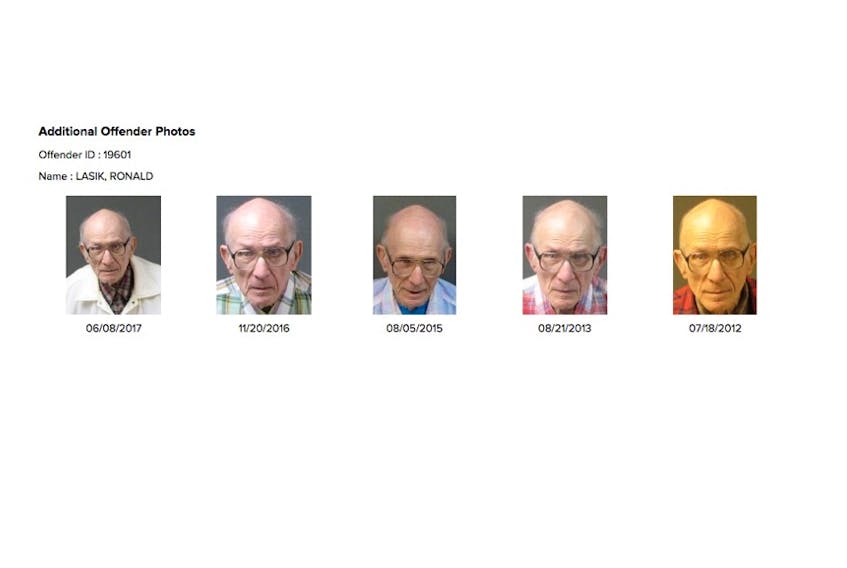Ronald Lasik looks like any frail, old man in an online set of photos taken year after year since 2010.
Except there’s the stark reason why Lasik’s photo must be updated every year, as required by the New York state sex offender registry.
The website will tell you what Lasik was convicted of in 1999 — deviate sexual intercourse and sexual contact with boys whose ages ranged from12 to 14.
It tells you his weight, height, eye colour and other physical details, as well as his risk to reoffend and that he was in a teaching position when the sexual crimes against the boys took place. Lasik is listed there for having a felony commited outside New York state by someone who currently lives in the state.
Lasik’s connection to this province is that in 1999 he was convicted of multiple charges resulting from incidents that occurred while he was a Christian Brother at the former Mount Cashel boys’ orphanage in St. John’s in the 1950s.
But you can’t look up Lasik — or anyone who is placed on the sex offender list here — to see if he’s on the Canadian registry, as that list isn’t public.
And you can’t look up someone like Peter Hoyles.

Hoyles is the man arrested recently for breach of parole while working in a canteen run by Coffee Matters at the Paradise Double Ice Complex.
In September 2017, Hoyles was sentenced to 3 ½ years in prison for sexually assaulting a 14-year-old girl.
If you didn’t even know Lasik’s name, you can search the New York registry by geographic area and scroll down, pick any name and, with just a click, view the image and see why exactly each offender is on the list and what they look like.
A spokeswoman for the state Division of Criminal Justice Services told The Telegram that, by law, New York can include Level 2 and 3 sex offenders (the most serious convictions) in an online directory. The law only permits information about Level 1 offenders to be provided through a toll-free number; callers must have at least one identifier: a date of birth, for example.
Google will tell you a fair bit about Hoyles, but only because media outlets covered his case.
Certain other cases, when covered by the media, will often mention a convicted person being placed on the Canadian sex offender list as a condition of sentencing.
The Canadian list — the National Sex Offender Registry — tracks sex offenders who have been convicted of designated sex offences and ordered by the courts to report annually to police.
This database is accessible to all accredited Canadian police agencies through a provincial/territorial registration centre.
But the public can’t access it.
The RCMP wouldn’t tell The Telegram the number of people currently on the list in Newfoundland and Labrador, because that’s police information only.
Businesses can request a code of conduct certificate from prospective employees to vet their criminal past, whatever the charge. (For many businesses, a prime concern is fraud or theft).
And certain employers or volunteer organizations — where the employee could be in a position of trust involving children and other vulnerable people — can request a vulnerable-sector check that will spell out convictions for sexual offences.
Different views
Opinions aren’t unified on the merits of making the Canadian sex offender list public.
Justice Minister Andrew Parsons declined comment on it through a department spokeswoman. Officials with the Town of Paradise — which is reviewing its contracts after the rink debacle, to make sure vulnerable-sector checks are required for contractors to request where applicable — would not comment.
Mount Pearl lawyer Lynn Moore is in favour of making the sex offender registry public, and compares it somewhat to Clare’s Law, an initiative advocated publicly by Parsons.
Parsons has said he is prepared to bring a form of Clare’s Law to the House of Assembly for debate.
Clare’s Law is named for Clare Wood, who in 2009 was murdered by her ex-boyfriend in the Greater Manchester area in the U.K.
The U.K.’s 2014 Domestic Violence Disclosure Scheme, better known as Clare’s Law, allows a partner or a concerned third party to request information from police about a potential perpetrator’s criminal record.
Saskatchewan was the first Canadian province to introduce such legislation, in December 2017 .
For Moore, who supports Clare’s Law, there’s a similar argument to be made in favour of making the sex offender registry public.

“I recognize that the whole idea of rehabilitation means people want to get on with their lives and that public shaming is not helpful. But I also think that individual citizens have a right to know who their neighbours are and who they are connecting with,” said Moore, who points out anyone can go to court with certain details and view the public documents related to a person’s conviction. (The details include date of birth).
But she said not too many people are aware of the process or that the cost — a $20 search fee — might be prohibitive.
People can look at online court dockets every day of the week listing accused people, a process that makes things easier for anyone charged with any offence to know where and when they are supposed to be. But those people still have a presumption of innocence.
So, argues, Moore, why isn’t the information on a convicted sex offender as readily available?
“It seems to be more of a function of that is not how we have done things, as opposed to anyone putting real thought into what we should be doing,” she said.
Moore said Clare’s Law is important for women’s safety, so they can find out whether someone they are dating or thinking of dating has a history of violence against women.
“It tips the scales in favour of your safety. It might also be enough to get men to change their behaviour — that is really what we want, for people to be safer and the world to be a safer place,” she said.
As for sexual violence, Moore said it should be the same thing, as it’s all one continuum — power, control and domination.
“What we are doing by not making information public is protecting (the convicted person’s) privacy at the expense of women’s safety, or children. And I don’t think that’s a fair equation,” she said.
St. John’s lawyer Will Hiscock also sees merit in it, especially as a young parent.
“The more information the better,” Hiscock said, adding those who commit serious sexual offences should face severe consequences, including having the information accessible to the public. He said the right to know, in those cases, should outweigh their right to privacy.
Keeping track
But St. John’s lawyer Mark Gruchy says the registry works well as it is now, as a tool of police agencies to conduct investigations and keep track of sexual offenders by residence and location.
Gruchy said the public’s interest can be protected where warranted by vulnerable-sector checks and generally by employers requesting codes of conduct.
Employers should make sure they do their basic due diligence, he said.
Sex crimes evoke great outrage, hate and rejection by society, even when the scale of the offences is diverse — from groping to a recidivist, repeat pedophile, Gruchy noted.
With the measures in place for law enforcement to do their jobs, and the ability of employers to do criminal background checks, there’s nothing secret, Gruchy said.
“It’s not like they’re just disappearing into the woods. We know who they are,” he said.

“The only thing (a publicly searchable database) would add is to shame people and would encourage people to focus heavily on (the offenders) in the community. … I have difficulty seeing the point of it when we have all these other mechanisms in place and when I know exactly what kind of public response it will provoke from some people.”
Ensuring that a third-party person could request copies of a criminal record under Clare’s Law in relation to domestic assault is not the same as putting a list of sex offenders on the internet with a map, Gruchy said.
There have been high-profile incidents of violence in the U.S., including the case in 2006 in which a Canadian man visited the homes of two sex offenders in Maine and fatally shot them.
While it’s fair for a business with clientele who are children to reject a child sex offender, or for to an employer to be leery of someone who has lied about their circumstances, Carey Majid, executive director of the Newfoundland and Labrador Human Rights Commission, noted that in general employers can’t just make a blanket decision based on a person having a criminal record, should it be unrelated to the job.
Rather, she said, businesses should ask all the pertinent questions and weigh it against the job description and duties.
On the commission’s website are guidelines for employers to go by when judging whether a conviction of whatever type is relevant to employment. Fraud and theft convictions, for example, are concerns in a job situation where someone handles an employers’ cash.
The result of not going through that process is unfairly weighted against those who have served their time and can’t find employment because their conviction has followed them, the guidelines suggest.
“Have a process and at the end of the day you might say, ‘I’m sorry,’” she said. “Get the story and compare it to the legitimate job duties and when you come to some sort of decision, explain it to the person,” Majid said.
“Don’t just do a criminal record check without asking questions.”









